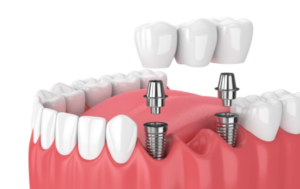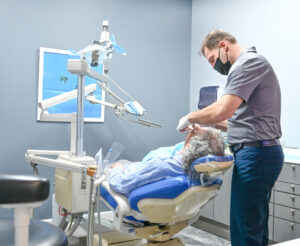The cost of 2 dental implants typically ranges from $6,000 to $10,000. The average cost of 2 dental implants with bone grafting is around $8,500. This article will help you understand what affects these costs and how to budget for your dental implants.
Introduction to Dental Implants
Dental implants are a state-of-the-art solution for tooth replacement, delivering permanent, lifelike results compared to traditional dentures or dental bridges. Unlike removable dentures, dental implants are surgically placed into the jawbone, providing a stable foundation that mimics the function and appearance of natural teeth. This makes them an attractive option for individuals seeking to restore their smile and improve their oral health.
The cost of dental implants can vary significantly, influenced by several factors such as the type of implant used, the complexity of the dental implant surgery, and the location of the dental office. For example, dental implants generally cost between $3,000 and $6,000 per implant, but this range can fluctuate based on the materials chosen and any additional procedures required. Understanding the costs involved in dental implant treatment is essential for anyone considering this investment in their oral health. By being informed about the various elements that affect the cost of dental implants, patients can better plan and budget for a solution that offers long-term benefits and a lasting improvement in quality of life.
Key Takeaways
- The cost for two dental implants ranges from $6,000 to $10,000, influenced by factors such as materials, surgical procedures, and patient health.
- Key factors impacting dental implant costs include the dentist’s experience, geographic location of the clinic, and the patient’s oral health condition.
- Investing in dental implants provides long-term value through durability, improved oral health, and enhanced quality of life.
Cost Breakdown for Two Dental Implants
When considering dental implants, understanding the full scope of costs involved is crucial. The total cost for two dental implants can range from $6,000 to $10,000, depending on various factors such as materials used and additional procedures required. Typically, the cost of a single dental implant ranges between $3,000 and $4,800, but this can increase based on specific patient needs and the complexity of the procedure.
The dental implant cost includes several components: the implant materials and components, the surgical procedure itself, and any additional procedures that may be necessary. For example, a bone grafting procedure may be required to prepare the jawbone for implant placement if there is insufficient bone density, which is essential for the success of the implant. The dental bone graft cost is an additional expense that can vary depending on the type of graft, the extent of the procedure, and the specialist’s expertise. Each of these elements contributes to the overall expense, and understanding them can help you budget effectively for your dental implant treatment.
Implant Materials and Components
The materials used for dental implants are a significant factor in the overall cost. Common materials include titanium, zirconia, and ceramic. Titanium is often preferred due to its durability and affordability. A traditional dental implant has three main components. These are the implant screw, the abutment, and the crown. The implant screw, typically made of titanium, anchors the implant to the jawbone. The crown, which functions as the visible tooth, can be made from various materials, including porcelain, metal, and zirconia.
If bone grafting is required, the type of bone material used—such as synthetic bone material or autografts—can also impact the total cost, as each source of bone material has different pricing and availability.
The cost of these components can vary significantly. The implant screw usually costs between $1,600 and $2,000, while the dental crown can range from $1,000 to $3,000 depending on the material and customization. Therefore, the choice of materials can influence the dental implants cost, and discussing these options during your consultation is important.
Surgical Procedure Costs
The surgical procedure for dental implants involves several stages and multiple visits, each contributing to the overall cost. The placement of a dental implant includes using the surgical room, tools, and the medical staff’s time. This step, known as the surgical placement of the implant post into the jawbone, is a key stage in the process and is distinct from later steps like crown attachment. Local anesthesia is commonly used, but additional sedation options can increase the cost. The estimated cost for a single dental implant procedure ranges from $3,100 to $5,800.
Patients typically receive an itemized care plan detailing the necessary procedures and associated costs. These costs can vary depending on the complexity of the case and any additional procedures required. Knowing these costs helps you prepare for the financial aspects of your dental implant surgery.
Additional Procedures
Additional procedures may be necessary to ensure the success of dental implants. For instance, a bone graft is a procedure where bone or bone-like material is added to the jaw to increase its density and volume, which may be needed if the jawbone lacks the necessary density to support the implant. Bone graft surgery involves placing this material into the jawbone, and is performed to create a stable foundation for the implant; the process, duration, and recovery time can vary depending on the complexity and extent of the graft. Bone grafting procedures are a common preparatory step for dental implants, especially in cases of bone loss, and may be required to ensure the long-term success of the implant. Bone grafts play a crucial role in supporting dental implants for patients with insufficient bone structure, and their necessity can influence both the cost and the treatment plan. A dental bone graft specifically refers to the use of bone or bone substitute material in the jaw for dental purposes, and the type and complexity of the graft can affect the overall duration and expense of the surgery. Synthetic bone material is also an option for bone grafting procedures, and it may be a cost-effective alternative compared to using the patient’s own bone. A sinus lift could also be performed to improve bone density in the upper jaw, enhancing the implant’s stability.
These additional treatments can significantly increase the overall cost of dental implants. The patient’s jawbone quality and density play a crucial role in determining whether these procedures are needed. Some patients may require more extensive preparation before implant placement, impacting the overall treatment plan and cost.
Factors Influencing the Cost of Two Dental Implants
Several factors influence the cost of two dental implants, so considering all aspects before proceeding with the treatment is important. These factors include the dentist’s experience and expertise, geographic location, and the patient’s oral health condition. The specialization in implant dentistry can also impact both the cost and quality of dental implant treatment, as practices focused on implant dentistry often use advanced technology and patient-centered approaches.
Each of these elements can cause the costs of dental implants to vary greatly depending on individual circumstances.
Dentist’s Experience and Expertise
The experience and expertise of the dentist performing the dental implant procedure can significantly impact the cost. More experienced dentists and oral surgeons charge higher fees, reflecting their advanced skills and specialized training. However, these higher fees often translate to better quality and longevity in the outcome of the procedure.
Specialized training in implantology ensures proper implant placement and restoration, which can justify the higher costs associated with experienced professionals.
When choosing a dental clinic, evaluating the clinic’s experience, quality of care, and communication enhances the overall patient experience.
Geographic Location
The geographic location of the dental clinic also plays a significant role in the cost of dental implants. Urban areas and cities generally have higher prices due to the increased living costs and advanced dental technologies available. Conversely, rural locations may offer lower prices, contributing to the overall cost difference.
Considering the location of your chosen dental clinic helps manage your budget effectively.
Patient’s Oral Health Condition
A patient’s oral health condition is another critical factor influencing the cost of dental implants. Conditions such as bone loss, gum disease, and the overall health of the mouth can determine the necessity for preliminary treatments before implant placement. Implants help prevent further bone loss and support the jawbone, which is essential for maintaining overall oral health.
For patients with multiple missing teeth or compromised oral health, additional treatments like bone grafting or tooth extraction may be required, increasing the overall cost of a missing tooth. In many cases, tooth extractions serve as a preliminary step for patients with multiple missing teeth, impacting both the procedure and the total cost. A thorough assessment of the patient’s oral health determines the necessary treatments and their associated costs.
Insurance and Payment Options for Dental Implants
Navigating the financial aspects of dental implants can be challenging. It’s important to work closely with your insurance company to understand your coverage, obtain cost estimates, and secure any necessary pre-authorizations. Most dental insurance plans typically provide limited or partial coverage for dental implants, often covering related procedures such as tooth extractions, bone grafting, or implant crowns, with coverage varying by policy. Understanding the role of dental insurance, available payment plan options, and other payment methods can help alleviate some of the financial burdens and make dental implants more affordable.
Explore how insurance, financing plans, payment plan options, and flexible spending accounts (FSAs) or health savings accounts (HSAs) can assist in covering dental implant costs.
Dental Insurance Coverage
Dental insurance coverage for implants varies widely. Not all dental insurance plans cover dental implants, so it’s essential to check the specifics of your policy. When dental insurance does cover implants, it often includes a portion of the costs, reducing out-of-pocket expenses. Patients may need to verify the coverage amount and specific procedures included in their plan with their insurance cover dental implants provider.
Many dental insurance plans typically have a limit on coverage for implants, which can affect the total cost. For example, some policies allow claims of up to $3,000 if the procedure is spread over two years. Understanding your insurance coverage is crucial for managing the cost of dental implants.
Financing Plans
Financing plans offer a viable solution for managing dental implant costs. Many dental offices provide flexible payment options, allowing patients to make manageable monthly payments instead of a lump sum. Personal loans, medical credit cards, and financing options are common financing options that can help spread out the cost over time, making the treatment more affordable.
FSAs and HSAs
Flexible Spending Accounts (FSAs) and Health Savings Accounts (HSAs) are excellent tools for covering dental implant expenses. These accounts allow you to use pre-tax dollars to pay for eligible dental procedures, effectively reducing your taxable income and overall expenditure.
Utilizing FSAs and HSAs can make affordable dental implants a more financially manageable option.
Cost Difference and Alternative Options
When evaluating tooth replacement options, it’s important to consider both the upfront and long-term costs. Dental implants typically have a higher initial cost compared to other tooth replacement options like dental bridges or traditional dentures. However, dental bridges often need to be replaced every 7-10 years, and traditional dentures may require frequent adjustments or replacements, which can lead to higher cumulative costs over time. Additionally, dentures that do not fit properly can contribute to bone loss and other oral health issues, making them less ideal for long-term oral health.
Dental implants, while more expensive at the outset, are designed to be a permanent solution that can last for decades with proper care. This long-term durability often makes them a more cost-effective choice in the long run. It’s also important to factor in any additional procedures that may be necessary, such as bone grafting or tooth extraction, which can increase the total cost of dental implant treatment. Consulting with an oral surgeon or dental professional can help you understand the full scope of your treatment plan and avoid unexpected costs.
Many dental insurance plans now offer partial coverage for dental implants, which can help reduce out-of-pocket costs. It’s a good idea to review your dental insurance policy or speak with your insurance provider to understand what is covered. For those concerned about the cost of dental implants, financing options such as medical credit cards or payment plans are often available through many dental offices, making it easier to manage the investment with manageable monthly payments. By exploring all available options, you can find a tooth replacement solution that fits both your oral health needs and your budget.
Long-Term Value of Dental Implants
Investing in dental implants offers substantial long-term value. Unlike other tooth replacement options, dental implants are designed to be a permanent solution that looks, feels, and functions like natural teeth.
Comprehensive dental care is essential to ensure the long-term success and value of dental implants, as it supports both clinical outcomes and patient confidence.
Here, we explore the durability, improved oral health, and enhanced quality of life that dental implants provide.
Durability and Longevity
Dental implants are renowned for their durability and longevity, often lasting upwards of 20 years with proper care. Studies indicate that dental implants maintain a success rate above 97% over a decade, making them a reliable and long-lasting solution for tooth replacement. Learn more about how long dental implants last.
Improved Oral Health
Dental implants significantly improve oral health by preventing bone loss in the jaw and preserving the facial structure. Research suggests that individuals with implants report higher satisfaction with their appearance and improved self-esteem.
This enhancement in oral health contributes to the overall success and longevity of dental implants.
Enhanced Quality of Life
Beyond their functional benefits, dental implants greatly enhance a person’s quality of life. They restore the ability to eat, speak, and smile confidently, boosting self-confidence and overall well-being.
This improvement in aesthetics and functionality underscores the long-term value of investing in dental implants.
Scheduling a Consultation for Dental Implants
Scheduling a dental implant consultation is the first step toward getting dental implants. During the consultation, your gums and jaw will be examined to determine your candidacy for implants. It’s also an opportunity to discuss treatment options and get an accurate cost estimate based on your specific needs. If you need several teeth replaced, your dentist can discuss options for multiple implants, such as implant-supported bridges, which may be more cost-effective than individual implants.
What to Expect During a Consultation
The dentist will perform a thorough examination of your jaw and gums during the consultation, often using x-rays to gather necessary information for the dental implant procedures treatment plan. Certain clinics provide free consultations. However, some may require a fee. This process is crucial in determining the best approach for your dental implant treatment.
Choosing the Right Dental Clinic
Choosing the right dental clinic involves comparing prices and evaluating the quality of care provided. Opt for a clinic with a strong track record and experienced staff to reduce the risk of complications.
Ensuring the clinic uses high-quality materials and offers personalized treatment plans can significantly enhance your overall experience. When comparing treatment plans for tooth replacement, consider whether individual implants or other solutions like implant-supported bridges are recommended, as this can affect both cost and complexity. It’s also important to understand the process and benefits of dental implants in Rockville, as they offer a reliable solution for replacing missing teeth.
Summary
In summary, the cost of dental implants varies based on several factors, including materials, procedures, and the expertise of the dental team. Single implants are often a more straightforward and affordable option compared to multiple implants, making them an attractive choice for many patients. Understanding these costs and the available payment options can help you make an informed decision. Dental implants offer significant long-term value, improving oral health and quality of life.
Investing in dental implants is a decision that pays off in the long run. By scheduling a consultation with a skilled dentist, you can embark on the journey to a healthier, more confident smile. Ready to take the next step?
Frequently Asked Questions
How much do dental implants generally cost?
Dental implants typically cost between $3,000 and $4,800 for a single implant. For two implants, expect a total cost ranging from $6,000 to $10,000, influenced by individual circumstances.
Does dental insurance cover the cost of implants?
Dental insurance may cover a portion of the costs for dental implants, but it varies by plan. Be sure to consult your insurance provider for specific coverage details.
What factors influence the cost of dental implants?
The cost of dental implants is primarily influenced by the dentist’s experience, the geographic location of the practice, and the patient’s specific oral health condition. Considering these factors can help you better estimate the overall expenses involved.
What additional procedures might be needed for dental implants?
Additional procedures like bone grafting or sinus lifts may be necessary to ensure the success of dental implants, particularly if there is insufficient bone density. It’s important to discuss these options with your dentist to understand how they may affect your treatment plan and costs.
What is the long-term value of dental implants?
Dental implants provide long-term value by lasting over 20 years with proper care, improving oral health and significantly enhancing quality of life. Their durability makes them a worthwhile investment for dental restoration.





